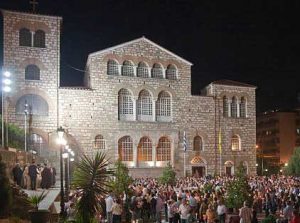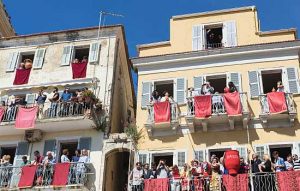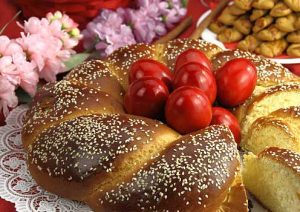Easter celebrationts in Greece and the Greek islands
 Easter in Greece is a time of profound religious significance, cultural richness, and joyous communal celebrations. Rooted in centuries-old traditions, this sacred occasion brings the entire country together in a harmonious blend of spirituality and festivity.
Easter in Greece is a time of profound religious significance, cultural richness, and joyous communal celebrations. Rooted in centuries-old traditions, this sacred occasion brings the entire country together in a harmonious blend of spirituality and festivity.
The preparations for Easter in Greece commence weeks before the actual celebration with the observance of Lent. This period of fasting involves abstaining from meat and dairy products, creating a solemn atmosphere as individuals reflect on their faith and prepare for the upcoming Easter festivities.
The pinnacle of the Easter observance is Holy Week, the week leading up to Easter Sunday. During this time, Greeks engage in a series of religious ceremonies and rituals that commemorate the events leading to the crucifixion and resurrection of Jesus Christ.
On Holy Thursday, a symbolic representation of the Last Supper unfolds as people across the country engage in the tradition of dyeing eggs red. The red color symbolizes the blood of Christ and is a powerful visual reminder of the religious significance of the occasion. Families come together to participate in this symbolic act, fostering a sense of unity and connection.
 Good Friday is a day of deep solemnity and mourning. Churches hold services to honor the crucifixion, and in the evening, somber processions take place in towns and villages. Participants carry an epitaphios, a beautifully adorned bier representing the body of Christ, through the streets, creating a moving spectacle that resonates with the gravity of the religious narrative.
Good Friday is a day of deep solemnity and mourning. Churches hold services to honor the crucifixion, and in the evening, somber processions take place in towns and villages. Participants carry an epitaphios, a beautifully adorned bier representing the body of Christ, through the streets, creating a moving spectacle that resonates with the gravity of the religious narrative.
The most eagerly awaited moment in the Easter calendar arrives on Holy Saturday night with the Resurrection service, known as the Anastasi. Churches across the nation are filled with worshipers holding unlit candles. At the stroke of midnight, the priest announces the proclamation, “Christos Anesti” (Christ is risen), and the congregation responds with the joyous declaration, “Alithos Anesti” (Truly He is risen). The atmosphere transforms instantly as church bells ring, fireworks illuminate the night sky, and people exchange greetings and kisses. The Resurrection service symbolizes the triumph of life over death, and the entire country rejoices in the renewal of hope and faith.
 Following the Resurrection service, families return home to partake in the “Paschal meal,” a feast that marks the end of the Lenten fast. Traditional dishes take center stage, with lamb roasted on a spit being a quintessential part of the celebration. Tsoureki, a sweet Easter bread adorned with red-dyed eggs, adds a delicious and symbolic touch to the festivities. Families and friends gather around tables laden with delectable treats, creating a warm and convivial atmosphere that embodies the spirit of Easter.
Following the Resurrection service, families return home to partake in the “Paschal meal,” a feast that marks the end of the Lenten fast. Traditional dishes take center stage, with lamb roasted on a spit being a quintessential part of the celebration. Tsoureki, a sweet Easter bread adorned with red-dyed eggs, adds a delicious and symbolic touch to the festivities. Families and friends gather around tables laden with delectable treats, creating a warm and convivial atmosphere that embodies the spirit of Easter.
Easter Sunday and the subsequent days are characterized by continued festivities, including more feasting, music, and dancing. Communities come together to celebrate the joy of Christ’s resurrection, and the air is filled with a sense of renewal and optimism.
While the overarching traditions of Easter are observed throughout Greece, each region may have its unique customs and events that add a distinctive flavor to the celebrations. These local variations contribute to the diversity of the Easter experience, showcasing the rich tapestry of Greek culture and heritage.
In essence, Easter in Greece transcends religious observance; it is a cultural phenomenon that unites the nation in a shared expression of faith, tradition, and community. The celebrations serve as a testament to the enduring significance of Easter in the hearts and lives of the Greek people, fostering a deep sense of identity and connection to their religious and cultural roots.
Why Greek Orthodox Easter in celebrated on diferent dates than the Catholic Easter
 The difference in the dates of Easter between the Greek Orthodox Church and the Roman Catholic Church (and some other Christian denominations) is a result of the use of different calendars to calculate the date of the feast.
The difference in the dates of Easter between the Greek Orthodox Church and the Roman Catholic Church (and some other Christian denominations) is a result of the use of different calendars to calculate the date of the feast.
The Western Christian tradition, which includes the Roman Catholic Church, follows the Gregorian calendar, introduced by Pope Gregory XIII in 1582 to reform the Julian calendar. This calendar is used to determine the date of Easter in Western Christianity.
On the other hand, the Eastern Orthodox Churches, including the Greek Orthodox Church, continue to use the Julian calendar for liturgical purposes. The Julian calendar, introduced by Julius Caesar in 45 BCE, has a different method for calculating leap years compared to the Gregorian calendar.
The primary factor causing the discrepancy in the date of Easter is the different methods used to determine the vernal equinox—the point in time when day and night are of equal length—on which the calculation of Easter depends.
The Gregorian calendar more accurately approximates the length of the solar year, making it more astronomically precise. As a result, the Western Christian tradition often celebrates Easter on a date different from that of the Eastern Orthodox tradition.
Despite the difference in the date of Easter, the theological significance and the core elements of the celebration remain the same across Christian denominations. Both traditions commemorate the resurrection of Jesus Christ, the central event in Christianity, albeit on different dates due to the use of distinct calendars.
History and Significance of Easter in Greece
Easter, known as “Pascha” in Greece, holds profound significance in the country’s cultural and religious landscape. This sacred holiday commemorates the resurrection of Jesus Christ and is considered the most important event in the Greek Orthodox calendar. The traditions observed during Easter are deeply rooted in ancient customs and practices that have been passed down through generations.
One of the key elements of Greek Easter is the period of Lent leading up to Holy Week, a time for fasting, reflection, and spiritual preparation. Holy Week culminates in a series of rituals and ceremonies symbolizing Christ’s crucifixion and resurrection.
Central to Greek Easter celebrations is the midnight Resurrection service on Holy Saturday, where church bells ring out joyously, signaling the end of Lenten fasting. The lighting of candles symbolizes the triumph of light over darkness and serves as a poignant moment of reverence for believers across Greece.
Traditional Easter Celebrations in Greece
During Easter in Greece, the celebrations are deeply rooted in tradition and spirituality. One of the most iconic customs is the “Anastasi” or Resurrection service on Holy Saturday night. As midnight approaches, churches across the country light up with candles as people gather to witness the moment when Christ is resurrected.
After the solemnity of Good Friday and Holy Saturday, Easter Sunday bursts with joy and festivity. Families come together to enjoy a feast that typically includes spit-roasted lamb, red-dyed eggs, traditional bread called tsoureki, and various local delicacies.
In many villages and towns, you can also experience unique traditions such as “pot throwing,” where people throw pots out of their windows to symbolize new beginnings. Additionally, elaborate parades featuring icons from local churches take place in some regions.
Experiencing Easter in Greece is a truly unforgettable cultural immersion that showcases the country’s rich heritage and religious fervor.
Popular Greek Islands to Visit during Easter
 As Easter approaches, many travelers flock to the stunning Greek islands to experience unique celebrations and traditions. One popular destination is Santorini, known for its picturesque white-washed buildings and breathtaking sunsets. During Easter, visitors can witness local customs such as fireworks displays and candlelit processions.
As Easter approaches, many travelers flock to the stunning Greek islands to experience unique celebrations and traditions. One popular destination is Santorini, known for its picturesque white-washed buildings and breathtaking sunsets. During Easter, visitors can witness local customs such as fireworks displays and candlelit processions.
Another must-visit island during this festive season is Mykonos, famous for its vibrant nightlife and beautiful beaches. Here, you can join in on traditional Greek Orthodox services and enjoy delicious feasts with locals.
For a more laid-back Easter experience, head to Crete, the largest of the Greek islands. Explore charming villages adorned with colorful flowers and partake in lively street festivals filled with music and dancing.
No matter which Greek island you choose to visit during Easter, you’re sure to be immersed in rich cultural experiences that will leave you with lasting memories.
Delicious Easter Foods to Try in Greece
 Easter in Greece is not just a religious holiday; it’s also a time to indulge in delicious traditional foods that have been passed down through generations. One of the most iconic Easter dishes is “Magiritsa,” a soup made with lamb offal, herbs, and avgolemono sauce.
Easter in Greece is not just a religious holiday; it’s also a time to indulge in delicious traditional foods that have been passed down through generations. One of the most iconic Easter dishes is “Magiritsa,” a soup made with lamb offal, herbs, and avgolemono sauce.
Another must-try dish during Greek Easter is “Tsoureki,” a sweet bread with a unique flavor of mahlab and mastiha. It’s often braided and decorated with red-dyed eggs symbolizing the blood of Christ.
Don’t miss out on tasting “Kokoretsi,” a savory dish made from seasoned offal wrapped in intestines and grilled to perfection over an open flame. The crispy exterior and tender filling make it a favorite among locals.
For those with a sweet tooth, indulging in “Galaktoboureko” is a must. This creamy custard-filled pastry topped with crispy phyllo dough and drenched in syrup will satisfy any dessert cravings you may have during your Easter celebrations in Greece.
Cultural Activities and Events during Easter in Greece
Discovering the cultural activities and events during Easter in Greece is like stepping into a vibrant tapestry of traditions and celebrations. From the solemn processions commemorating Christ’s crucifixion to the joyous feasts marking His resurrection, every moment is steeped in rich history and deep-rooted customs.
In many towns and villages across Greece, you can witness mesmerizing folk dances, elaborate flower-strewn decorations adorning homes and churches, as well as traditional music performances filling the air with festive melodies. One of the most iconic events is the “Anastasi” midnight service on Holy Saturday when people gather outside churches holding candles eagerly waiting for the Resurrection announcement.
During Easter Sunday, locals engage in friendly competitions like egg cracking or participate in lamb roasting festivities where families come together to enjoy delicious food prepared with love and care. The sense of community spirit during this time is truly heartwarming.
Immerse yourself in Greek culture by attending local events, tasting traditional delicacies, and engaging with friendly locals who are always eager to share their customs.
Easter in the Greek islands
Easter in the Greek islands, including Crete, the Cyclades, and the Ionian Islands, is a unique and enchanting experience that blends the beauty of the landscapes with the rich tapestry of local traditions. While the overarching Easter celebrations share common elements with the mainland, each island group brings its own distinct flavor and customs to the festivities.
Easter in Crete
The largest of the Greek islands, Crete, boasts a vibrant and diverse Easter celebration deeply rooted in its unique cultural heritage. The island’s residents wholeheartedly embrace the religious and folkloric aspects of the season. In Crete, the Resurrection service is a particularly moving event, with candles illuminating the night and churches adorned with flowers. After the midnight proclamation, people gather in central squares and narrow streets to celebrate with traditional Cretan music and dance. The culinary delights of the Paschal feast in Crete often include local specialties, such as lamb cooked with aromatic herbs and cheeses.
Easter in the Cyclades
The Cycladic islands, including popular destinations like Santorini and Mykonos, offer a picturesque setting for Easter celebrations. The iconic white-washed buildings against the backdrop of the deep blue Aegean Sea create a stunning atmosphere. In the Cyclades, the epitaphios procession on Good Friday is a significant event, with locals participating in a solemn and emotional march through narrow alleys. On Easter Sunday, the islanders engage in a joyful feast, featuring freshly caught seafood, local wines, and the traditional Easter bread. The Cyclades’ unique charm adds an extra layer of magic to the religious and cultural festivities.
Easter in the Ionian Islands
The Ionian Islands, including Corfu and Zakynthos, showcase a distinctive blend of Venetian, French, and British influences in their Easter celebrations. Corfu, in particular, is renowned for its grand Easter festivities. On Holy Saturday morning, the town of Corfu is transformed into a vibrant tapestry of colors as locals throw clay pots from their balconies, symbolizing the renewal of life. The Resurrection service in Corfu is a majestic event, with a large procession and a notable focus on music and choir performances. The culinary traditions of the Ionian Islands shine through in the Easter feast, featuring local dishes like pastitsada (a pasta and meat dish) and the island’s famous kumquat liqueur.
Across all the Greek islands, Easter represents a time when communities come together to celebrate their faith, share local traditions, and enjoy the bounties of the region’s diverse culinary offerings. The unique cultural nuances of each island group contribute to the richness and diversity of the Easter experience in Greece, making it a truly unforgettable celebration.
Easter in the Dodecanese Islands
The Dodecanese, a group of islands in the southeastern part of the Aegean Sea, offers a captivating setting for Easter celebrations, blending the rich cultural traditions of Greece with the unique local characteristics of each island. This island cluster, which includes Rhodes, Kos, and Patmos, among others, showcases a distinctive blend of history, folklore, and religious fervor during the Easter season.
How to Plan Your Easter Trip to Greece
Planning your Easter trip to Greece can be an exciting and fulfilling experience. Start by deciding which Greek island you want to visit during this festive season – from the serene Santorini to the vibrant Mykonos, each island offers its own unique charm.
Next, book your accommodations in advance as Easter is a popular time for tourists in Greece. Whether you choose a cozy guesthouse or a luxurious resort, make sure to secure your stay early.
Don’t forget to try the delicious Easter foods that Greece has to offer – from savory lamb dishes to sweet tsoureki bread, experiencing traditional Greek cuisine is a must during this time of year.
Immerse yourself in the local culture by participating in Easter events and activities such as attending church services, joining in on traditional dances, and watching fireworks displays.
Pack accordingly for your trip – light clothing for sunny days and layers for cooler evenings. And most importantly, embrace the spirit of Easter in Greece by enjoying all that this beautiful country has to offer during this special time of year.
